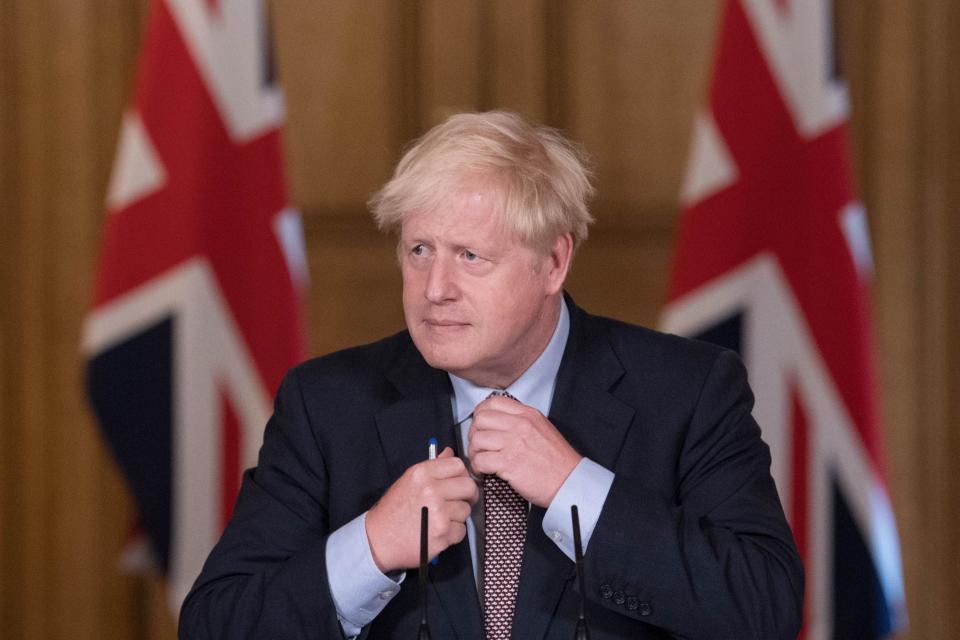Boris Johnson Gives the EU a Reason to Walk Away
(Bloomberg Opinion) -- Negotiations between the U.K. and the European Union on their future trade relations after Brexit were never going to be easy. After all, it took more than three years (and several near misses) just to agree the terms of Britain’s departure from the bloc. But talks were expected to stay within the wonkish, technical world of tariffs and product standards, since existential issues like how to deal with the flow of goods across the Irish border without undermining peace or the integrity of the EU market were amicably settled.
That has changed in spectacular fashion.
Few trade negotiators have found themselves in the position of the EU’s Michel Barnier, who arrived in London this week intending to break an impasse over issues such as state aid only to find Boris Johnson’s government doubling down on a bid to openly breach international law by rewriting the terms of Brexit itself. Legislation published on Wednesday would allow Britain to ditch measures like customs paperwork, designed to avoid a return to a hard border in Ireland.
Hence why exasperated EU officials, who’ve long refrained from calling Johnson’s bluff over myriad threats to walk away and make a messy “no-deal” scenario reality, are now sending their own signal that talks are nearing collapse. The EU has begun studying the possibility of legal action against the U.K. over the proposed legislation, as reported by my Bloomberg News colleague Alberto Nardelli, with obvious grounds to retaliate if the bill becomes law. That is tantamount to closing the door on trade negotiations.
Sketching out a lawsuit may not sound particularly aggressive in a world where Donald Trump breezily threatens to tear up everything from free trade agreements to NATO. But in the staid world of Brussels diplomacy, this is a clear message. If Johnson makes good on his bid to breach international law, Barnier may as well climb back onto the Eurostar.
The multistep legal process to launching a complaint via the European Court of Justice would likely run well beyond the December deadline for reaching a trade deal. And while Brussels technocrats have always tried to insulate talks from the saber-rattling of politicians, there would very likely be no trust left to agree on the fine print, and no real ability for Barnier to convince the EU’s 27 members and its European Parliament to sign it into a binding treaty.
Such a move will no doubt prompt the usual accusations of high-handed Brussels imperialism from Johnson and his Brexiteer colleagues, who have never shied away from an opportunity to whip up public opinion. Johnson ally Bernard Jenkin has already justified breaking the terms of the Brexit withdrawal agreement by characterizing the move as an independent country striking back against an “empire.” Yet this will only reinforce EU leaders’ gut feeling that the war for British hearts and minds, which seemed so vital when a second referendum or change of divorce terms looked possible, is over and not worth fighting anymore.
The stakes are much higher now. International law and respect for the withdrawal agreement is a red line thicker and redder than any possible compromise on issues like state aid rules or negotiated access to U.K. fishing waters.
Europeans can take comfort from the fact that the ripple effects of such a move from Johnson would go well beyond the region. In the U.S., where the U.K. is still seen as a pre-eminent European actor despite Brexit, Nancy Pelosi warned Johnson that any breach of Britain’s Brexit obligations and undermining of peace in Northern Ireland would dash hopes of a U.K.-U.S. trade deal. One can imagine Asian countries thinking similar thoughts about the U.K.’s credibility as a negotiating partner.
A no-deal outcome isn’t certain, but the risk is alarming. Free trade between the U.K. and EU has helped prosperity on both sides, and arguably the world. Even so, geopolitics and defending the rule of law have to take priority. Rather like Turkey’s persistent saber-rattling to the EU’s East, the U.K. threatens to become a destabilizing force to the EU’s West. Johnson has inadvertently given the Europeans another reason to stick even closer together.
This column does not necessarily reflect the opinion of the editorial board or Bloomberg LP and its owners.
Lionel Laurent is a Bloomberg Opinion columnist covering the European Union and France. He worked previously at Reuters and Forbes.
For more articles like this, please visit us at bloomberg.com/opinion
Subscribe now to stay ahead with the most trusted business news source.
©2020 Bloomberg L.P.




